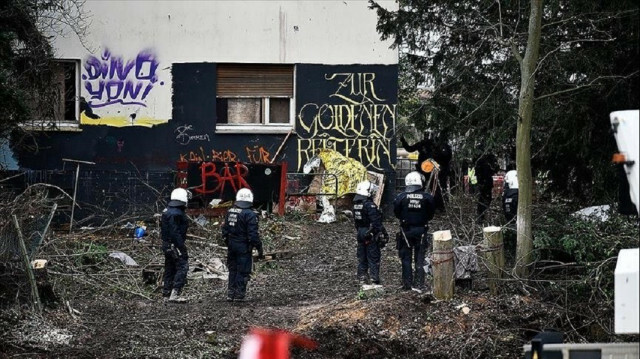
Activists’ spokesperson Mara Sauer says they will resist plans to demolish village of Lutzerath to expand nearby coal mine
German climate activists vowed to continue anti-coal mine protests in the western village of Lutzerath after dozens of protesters were injured in a heavy-handed police crackdown on Saturday.
“We’ll continue our resistance in the coming days,” Mara Sauer, a spokesperson of the activists, told Anadolu on Sunday, adding that coalmine expansion plans threaten important environment and climate goals.
“We’re staying in Lutzerath. The coal mining here, it should be stopped. This is the source of the climate crisis. That has to stop,” she said.
More than 1,500 police officers have been deployed in the area since Tuesday to forcibly evict climate activists from treehouses and buildings they occupied in Lutzerath.
Police removed hundreds of activists from the village in the past couple of days, but several activists were still resisting eviction from treehouses and underground tunnels.
On Saturday, thousands of demonstrators attended a rally near the village to protest the German government and the mine expansion plans, with organizers saying the crowd was 35,000 strong.
Dozens of climate activists were injured when the police used pepper spray and batons to disperse demonstrators. Activists accused the police of using excessive force against peaceful protesters.
Lutzerath was occupied by anti-coal activists for two years and became a symbol for environmentalist groups demanding an end to the use of coal and fossil fuels.
Climate activist Bente Opitz criticized the German coalition government and the pro-environment Green party for not living up to their pledges to phase out coal and reduce gas emissions.
“The Greens had supported us in the past when we occupied this village, but after they joined the coalition government they changed their position,” she told Anadolu.
“They started to claim that Germany needs the coal beneath Lutzerath to ensure energy security,” she added.
Opitz said German climate activists have lost hope in the government, and don’t believe the ruling parties will take any serious measures to combat the climate crisis.
“We’ve seen in the past couple of years that Germany has done nothing to comply with limiting global warming to 1.5 degrees Celsius. So we’re also not surprised by their recent decision,” she said.
Environmental groups had hoped the village would be spared after Chancellor Olaf Scholz's center-left coalition, including the Green party, came to power three years ago, and announced ambitious climate protection goals.
Russia's war in Ukraine, however, triggered a severe energy crisis in Germany, pushing Berlin to restart mothballed coal plants to ensure the country’s energy security.
Energy company RWE is planning to demolish the village of Lutzerath to expand the Garzweiler coal mine.
The company said in a statement that the coal under Lutzerath is needed “to make optimal use” of the lignite fleet during the energy crisis.
Under an agreement by the government, RWE will bring forward its coal phase-out by eight years, and end lignite-based electricity generation by 2030.
Hello, the comments you share on our site are a valuable resource for other users. Please respect other users and different opinions. Do not use rude, offensive, derogatory, or discriminatory language.
The floor is all yours.








